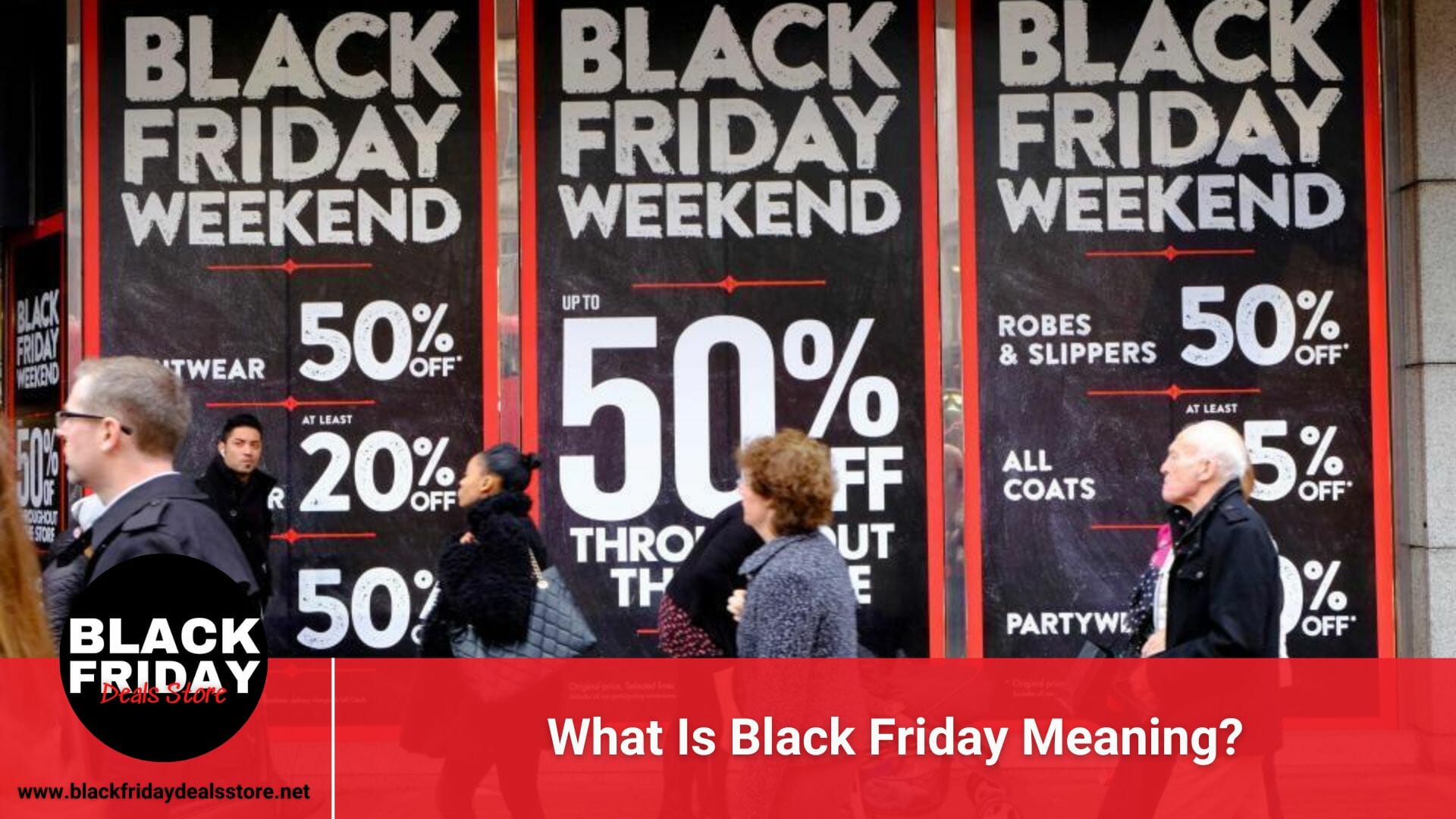Black Friday is a day after Thanksgiving when many retailers offer huge discounts. The term has become widely known as the official start of the holiday shopping season.
But the wholesome image of tryptophan-happy shoppers descending on local malls has only been around for a little while. The earliest uses of the term date back to 1869 and had nothing to do with Christmas shopping.
Understanding the Origins of Black Friday
Black Friday is the day after Thanksgiving, when Americans go on massive shopping sprees. It is one of the most important shopping days of the year, and it also serves as the official start of the Christmas season. Many stores offer sales and discounts on electronics, clothes, furniture, and other items. In addition, many retailers open at very early times on Black Friday so that shoppers can get their purchases before the rush.
The origin of the term Black Friday is a bit murky. Some people believe that the name came from the fact that it is a busy and hectic day for police officers in Philadelphia, where huge crowds of suburban tourists and shoppers converge on the city to go shopping. The police officers have to deal with accidents, fights, and shoplifting on this day.
However, the first recorded use of the term was in 1869 and had nothing to do with holiday shopping. Two ruthless Wall Street financiers named Jay Gould and Jim Fisk were trying to corner the gold market by buying up as much of the precious metal as possible. Their months-long scheme was thwarted on September 24, when President Ulysses Grant intervened and sent the price of gold plummeting.
The Cultural Significance of Black Friday
In the United States, Black Friday is often seen as the unofficial start of the holiday shopping season. Retailers are known to offer deep discounts on products like TVs, mattresses, kitchen appliances, and clothing. This can lead to crowded stores and long lines, as consumers compete for the best deals. It can also be stressful for shoppers, as many items are sold out quickly or have limited stock. In addition, many people end up overspending on this day and purchasing unnecessary goods.
The term Black Friday was originally used by Philadelphia police in the 1960s to describe heavy traffic and crowds on the day after Thanksgiving. But it has since become synonymous with the busiest shopping day of the year. Some people believe that the name is a reference to accounting, where red ink indicates a loss and black ink means a profit.
In recent years, retailers have been promoting Black Friday sales earlier and earlier in the week. This has led to some consumers avoiding Black Friday altogether and instead shopping on Thanksgiving or Cyber Monday, which is the Monday following Black Friday. In the past, revenue-wise, Black Friday was the biggest day of the year for most brick-and-mortar stores, but in recent years this has been challenged by online-only sales events such as Cyber Monday.
The Economic Implications of Black Friday
Most shoppers know that Black Friday is the day after Thanksgiving when retailers slash prices to attract consumers. Many believe the holiday earned its name because it’s when stores go from operating at a loss, or being “in the red,” to earning profits, or being “in the black.”
While some shoppers are still drawn in by discounts and sales on electronics and popular toys, others are cautious about how much they spend and are concerned about their impact on the environment. In addition, high prices for food, rent and gasoline have weighed on consumer spending, making them more selective about what they buy.
Some retail brands have tried to mitigate the impact of Black Friday by extending their sales events into December and using online promotions throughout the year. However, shopper fatigue and rising costs have made them wary of false advertising, with many shoppers being sceptical about what they perceive as big discounts. This has led to some retailers who normally do not participate in Black Friday rushing to offer deals in order to shift unsold inventory. This is a strategy that is likely to have diminishing returns. Ultimately, retail brands that focus on creating a positive customer experience and developing brand-right products can thrive without discounting.
Black Friday Around the World
The Black Friday shopping craze has spread across the globe, with consumers in many countries looking for bargains on electronics, fashion and other products. According to Google Trends, the peak of shoppers’ interest in these deals occurs on the Friday after Thanksgiving. However, the sales are often a multi-day event, stretching out for weeks or even months before and after that date.
In the past, the name “Black Friday” was used to describe a day of bad news or disaster, but it was not associated with holiday shopping at that time. The earliest reference to the term dates back to 1869, when plummeting gold prices triggered a stock market crash that sent the markets into turmoil.
Despite its gloomy origins, retailers have embraced the phrase and promoted it as a day when they make good profits. The phrase was widely used nationwide by the 1980s, although some people believe that it was invented in Philadelphia, where police officers described the chaos caused by large crowds of suburban tourists coming into the city to shop and attend Army-Navy football games.
While the Black Friday phenomenon is a huge boon for American retailers, it is not without its critics. Over the years, frenzied crowds competing for discounted merchandise have resulted in injuries and even deaths. Some communities are trying to ban the sale of certain goods on this day, while others are pushing for more sustainable ways of shopping.
Criticisms and Controversies Surrounding Black Fri
Black Friday is often criticized for being chaotic and overwhelming, as shoppers are often met with long lines and limited inventory. This can lead to frustration and a desire to shop elsewhere. In addition, many stores offer highly promoted sales that can lead to over-consumption and unsustainable buying habits. In addition, many retailers are criticized for using the term Black Friday to sell themselves rather than their products.
In recent years, some brands have started to reject the idea of Black Friday altogether. Some have even begun closing their stores or halting online sales on the day after Thanksgiving in an effort to promote sustainable consumption and fairer working conditions.
One such example is the clothing brand Pretty Little Thing, which faced criticism for offering Black Friday discounts of up to 99%. The company faced calls to explain how it could offer such low prices while maintaining fair pay and working conditions for its factory workers in England. In response, the company said that it would be increasing its wages and working conditions to address these issues. However, critics say that such actions are not enough to offset the negative impacts of Black Friday. They also point out that some companies that claim to be anti-Black Friday are engaging in greenwashing by purchasing carbon offsets to reduce their environmental impact.
Black Friday in the Digital Age
As technology has advanced, Black Friday has evolved from a day of shopping at local brick-and-mortar stores to a global online event. It is a time for retailers to offer major discounts on electronics and toys. This is an important event for retailers, as it usually leads to increased demand throughout the holiday season.
While many consumers enjoy the excitement of shopping on Black Friday, others are dreading the crowds and long lines. To avoid the hassle, many shoppers prefer to shop online. In addition, some retailers have started to open their online stores earlier than their physical shops. This allows consumers to avoid the crowds and still take advantage of the deals.
Regardless of whether they are shopping in-person or online, most consumers look for Black Friday sales. Moreover, nearly 9 in 10 people compare prices from different retailers before making a purchase. In addition, Black Friday is a great opportunity for retailers to boost sales and brand awareness. As such, it is not surprising that Black Friday is the biggest shopping day of the year. The popularity of Black Friday has grown over the years, and it is likely to continue to dominate retail.
Conclusion: What Black Friday Meaning?
Black Friday has come to be associated with shopping and bargains, but it has a darker side as well. It was first used in 1869 in reference to the failed attempt by Wall Street financiers Jay Gould and Jim Fisk to corner the gold market, which resulted in a disastrous economic crash that would be felt for years to come. More recently, the term has come to refer to the day after Thanksgiving when retailers typically experience a boost in sales and are able to turn a profit after operating at a loss for most of the year. This article was originally published in December [year] and has since been updated.

